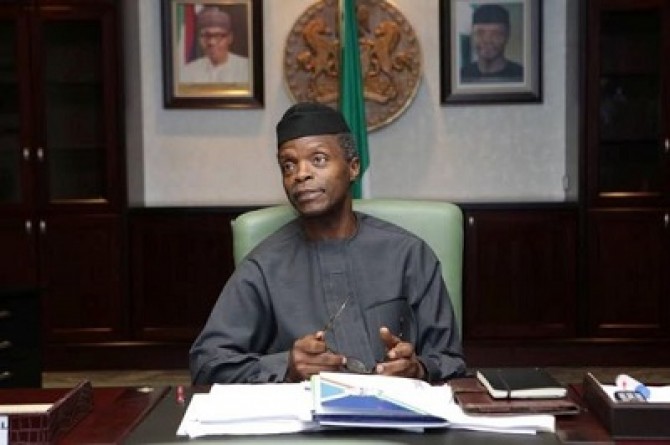Vice President Yemi Osinbajo has decries the absence of strong parties in Nigeria. He said the opposition People Democratic Party (PDP) is on death row while his ruling All Progressives Congress (APC) is gasping for breath.
Vice President Osinbajo spoke at the “National Conference on Political Party Supremacy and the Dynamics of Parliamentary Autonomy”, organized by the National Institute for Policy and Strategic Studies (NIPSS) in Abuja yesterday.
The Vice President, represented by the special adviser political to the president, Senator Babafemi Ojudu tasked the institute to go into research and see how the country can begin to build very strong parties.
“Today, we cannot talk of strong parties in Nigeria. The PDP is on death row, the APC is gasping for breath, therefore, it is very important that in building our party we must also look out for leaders that can work assiduously to mobilize people, leaders with conviction, leaders who are independent, leaders who are courageous, leaders who have capacity, and leaders who are disciplinarian.
“If we have these leaders and we appoint them to lead our parties both at national level and at the local level, we can be talking of political parties that will deliver the dividends of democracy to the people,” he said.
On the issue of supremacy and autonomy, Osinbajo said, “Concern should be directed at strengthening the political parties as things stand today our political parties are very weak.”
He stressed the need to strengthen the political parties and also disagreed with former Senate President, Ken Nnamani who said Nigerians have right under the constitution to go from one party to the other.
According to him, “If we keep jumping from one party to the other there will be no way we are going to strengthen the existing ones. People should be able to stay in their political party, work at strengthening them and ensure that it even becomes a family culture whereby my son, my grand son, great-grand son will know themselves.
He pointed out that parties fashion philosophies and ideologies for which they mobilize around, recruit members, and draw up manifestos and also sponsor candidates for elective offices, both in the executive and the legislature.
“When you see the tension we have now it is because we have not paid adequate attention to building strong party. Where the party is strong and it understands it mission, it will promote its ideology and make its elected officials to subscribe to its ideology and manifesto.”
He further stated that where disagreement arose, the executive will come together and bring members of the caucuses of the National Assembly or the state assembly together and they will argue and debate , noting that disagreement on the pages of newspaper or on the floors of parliament are unheard of.
He called on all political actors in Nigeria to build very strong parties and noted that it is unacceptable for a lawmaker elected by a party that produce the leader of the executive to get up in the parliament and drag down such official as that is the duty of the opposition.
In a veiled reference to APC lawmakers in the National Assembly he noted, “You cannot disparage your own party, you cannot disparage official elected by your own party. What will be the cause of that? Both the people in the legislature and the executive must have gotten there based on issues and ideals they don’t subscribe to. If that is the case, should there be any disagreement at all, there should be an avenue for resolving that disagreement.”
He contended that it is not acceptable for any lawmaker to build road blocks on the part of programmes for which his party was elected to power. According to him, “My party was elected on the basis of the promises we made to the people that we are going to provide security across the country, fight corruption and diversify the economy and provide for the poor people of this country. When you subscribe to these and you now get to the parliament and made it your duty to dismantle this, then there is a problem.
“Everyone of us present in this hall must have heard one thing or the other about parties that operated in the First and Second Republic. These parties were very strong and the members were committed to the ideals, whether they agree with those ideals is a different matter.




